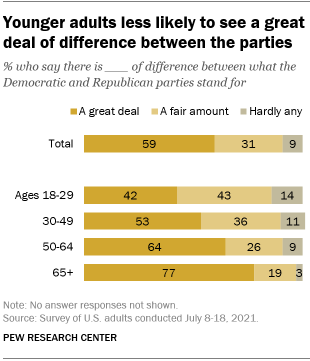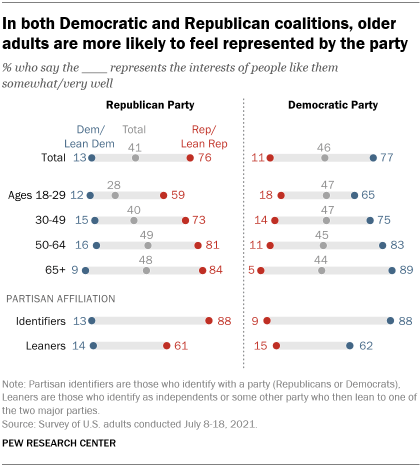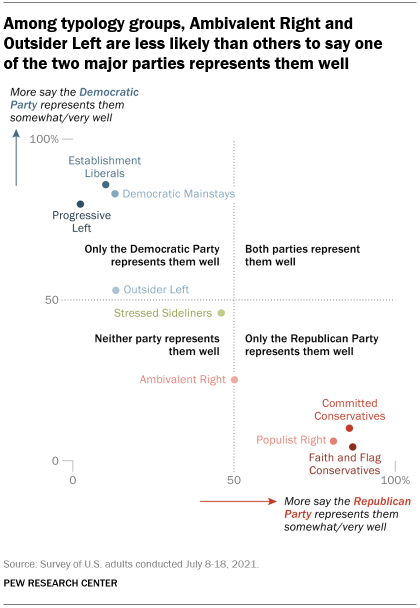Nearly six-in-ten U.S. adults (59%) see a great deal of difference between the two major political parties, up from 55% just two years ago and substantially higher than in prior decades. Yet as in past years, there are wide age differences in these views: Younger adults are less likely than older adults to see a great deal of difference between the parties, and they are less likely to say that either party represents the interests of people like them well.
Roughly three-quarters of those ages 65 and older (77%) say there is a great deal of difference between the two major parties, compared with 64% of those ages 50 to 64, 53% of those 30 to 49 and 42% of those 18 to 29. This pattern holds within both the Democratic and Republican coalitions. Three-quarters of Democrats and Democratic-leaning independents ages 65 and older say there is a great deal of difference between the two parties, as do 80% of their Republican and Republican-leaning counterparts. But just 42% of both Democratic and Republican adults under the age of 30 say this.
To assess Americans’ views about political parties and representation, we surveyed 10,221 U.S. adults from July 8 to 18, 2021. Everyone who took part is a member of Pew Research Center’s American Trends Panel (ATP), an online survey panel that is recruited through national, random sampling of residential addresses. This way nearly all U.S. adults have a chance of selection. The survey is weighted to be representative of the U.S. adult population by gender, race, ethnicity, partisan affiliation, education and other categories. Read more about the ATP’s methodology.
Here are the questions used for the report, along with responses, and its methodology. For more on the political typology, see “Beyond Red vs. Blue: The Political Typology.”
Across all age groups, majorities of Republicans and Republican-leaning independents say the GOP represents the interests of people like them very or somewhat well. However, older Republicans are more likely than younger Republicans to say this: 84% of Republicans ages 65 and older say the GOP represents the interests of people like them at least somewhat well, compared with 59% of Republican adults under 30.
The pattern is similar among Democrats and Democratic-leaning independents. Nearly nine-in-ten Democrats 65 and older (89%) say the Democratic Party represents the interests of people like them at least somewhat well. Democrats ages 18 to 29 are 24 percentage points less likely to say this.
Overall, younger adults in the United States are less likely than older adults to identify with a party – and more likely to identify as independents who lean toward one of the two major parties. Still, even among those who identify with a party, younger Republicans are less likely than older Republicans to say the GOP represents the interests of people like them well, and younger Democrats are less likely than older Democrats to say this about the Democratic Party.
These age patterns are reflected in Pew Research Center’s 2021 political typology, which segments the U.S. public into nine groups based on their political values. Within each partisan coalition, the groups that stand out for their lukewarm assessments of the party they tend to support are younger, on average, than other groups.
Just half of Ambivalent Right – a Republican-oriented group that diverges from traditional GOP positions on immigration and some social issues and is less positive than other GOP groups about former president Donald Trump – say the Republican Party represents the interests of people like them very (4%) or somewhat well (46%). By comparison, at least eight-in-ten in each of the other three Republican-oriented groups say this. Ambivalent Right also are substantially younger than other GOP-oriented groups: They are the only Republican-oriented group in which a majority (63%) are under age 50.
Outsider Left – a group that holds liberal attitudes across a wide range of issues and overwhelmingly votes Democratic – are nevertheless lukewarm toward the Democratic Party. Roughly half of Outsider Left (53%) say the Democratic Party represents the interests of people like them very (4%) or somewhat well (50%). By comparison, at least eight-in-ten in each of the other Democratic-oriented groups say the Democratic Party represents the interests of people like them somewhat or very well. Outsider Left are the youngest typology group overall.



